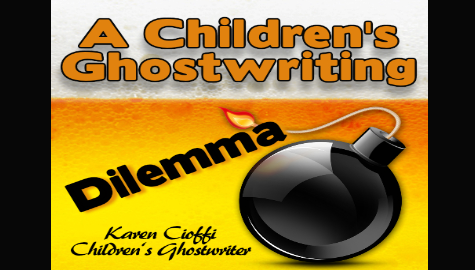I get ghostwriting clients from all demographics. I work with psychologists, therapists, medical professionals, grandparents, parents, teachers, and others who, for whatever reason, want to have a children’s book ghostwritten.
Now and then, I get a client who trusts my writing skills enough to hire me to ghostwrite or rewrite his story, but then doesn’t want to take my advice.
I understand that people can be very passionate about their story ideas, outlines, or manuscripts. Being passionate about a project is a good thing. But when that passion gets in the way of writing a professionally written story, it’s not a good thing.
Let me give an example.
You’ve written an excessive number of words for a children’s fiction picture book. It’s a detail-oriented and fact-based subject. You’ve also had illustrations created.
The first thing the writer explains is that a picture book should be under 700 words, and if you’re going the ‘real’ traditional route, it should be well under that, or whatever the current children’s writing guidelines are at the time.
The writer then explains that writing a nonfiction book rather than a fiction book would better serve the story information.
You don’t care. You insist it needs to be as many words as it takes to get all the facts down. You also insist it be a fiction story.
At this point, the writer explains that you’d be better off with a chapter book. The word count would allow for 5,000 to 15,000 words, which would be enough to get everything you want in the story while allowing for a full story arc.
Again, the writer’s advice goes out the window. You still insist it be a picture book, even if it ends up being a jam-packed 64-page picture book.
In this scenario, it goes on and on. You want more facts than story. You don’t want the protagonist to have realistic characteristics or behavior. In other words, you don’t want him to have any bad characteristics.
In this situation, you put the pen in the writer’s hand and tie her hands behind her back.
Here’s another example.
You’ve written a story about your pet. You think it’s terrific, and everyone will love it.
The problem is it’s poorly written:
– It doesn’t have a full story arc.
- It’s primarily telling rather than showing.
- It begins with information that has nothing to do with the story.
- There’s no real conflict.
- The story has contradictions in it.
- The story doesn’t make sense – it lacks clarity.
You listen to what the writer has to say, and she writes an engaging story that meets current publishing guidelines.
Upon reading it, you decide you want some scenes that didn’t work back in the story.
The writer throws her hands in the air.
This creates quite a dilemma for the ghostwriter.
- Should the writer argue with the client?
- Should she drop the client?
- Should she compromise on specific scenes or chapters?
- Should she advise the best she can, then write what the client wants?
I’ve had one or two clients who accepted the completed manuscript and later made their own changes to it. I’m just thankful my name isn’t anywhere on or in their books.
When you hire a professional writer, it’s because you don’t have the writing skills or knowledge of the children’s book industry to write a publishable book.
While ghostwriting walks a fine line between what needs to be done for a good story and the client’s vision, it should ultimately be about the young reader.
I’ve been told by a client that I don’t write for the client or myself; I write for the reader. And that’s how it should be for any author.
You want the reader to be absorbed in a good story. The story should be engaging, understandable, and memorable. It should be a story that kids will love to read or have read to them.
An analogy.
When I told a writing friend about this particular ghostwriting problem, she gave the analogy of someone going to the doctor for an ailment. The doctor gives his advice. Then the person asks her beautician if she should follow the doctor’s advice.
Another one: if you know nothing about cars and bring yours to the mechanic because the brakes aren’t working, you wouldn’t second-guess him. You wouldn’t tell him how to fix the brakes. And you certainly wouldn’t try to adjust what the mechanic did.
It’s the same with a professional children’s ghostwriter. If you’re paying for her writing skills and knowledge, let her do her job.
Trust that she’ll keep your vision for the story while making it a publishable book you can be proud to be the author of.

I’m a working children’s ghostwriter, rewriter, and coach I can help turn your story into a book you’ll be proud to be the author of, one that’s publishable and marketable.
OTHER HELP I OFFER:
HOW TO WRITE A CHILDREN’S FICTION BOOK
A DIY book to help you write your own children’s book.
FICTION WRITING FOR CHILDREN eCOURSE
4-Weeks / 8 Sections Guided Self-Study Course
You can contact me at: kcioffiventrice@gmail.com.

Writing a Fiction Story – Walking Through Walls Backstory
The Pros and Cons of Publishing with a Small Publisher

